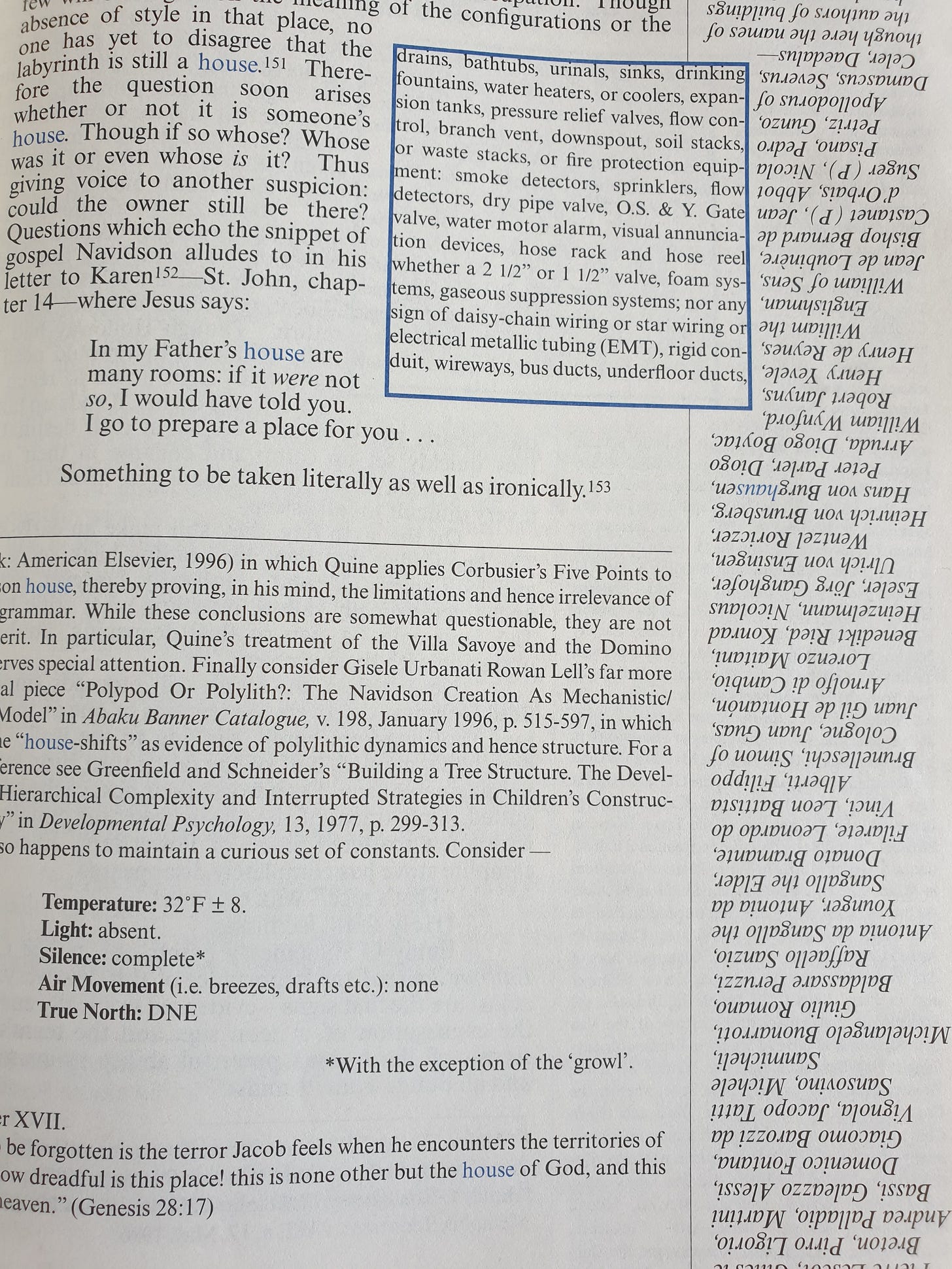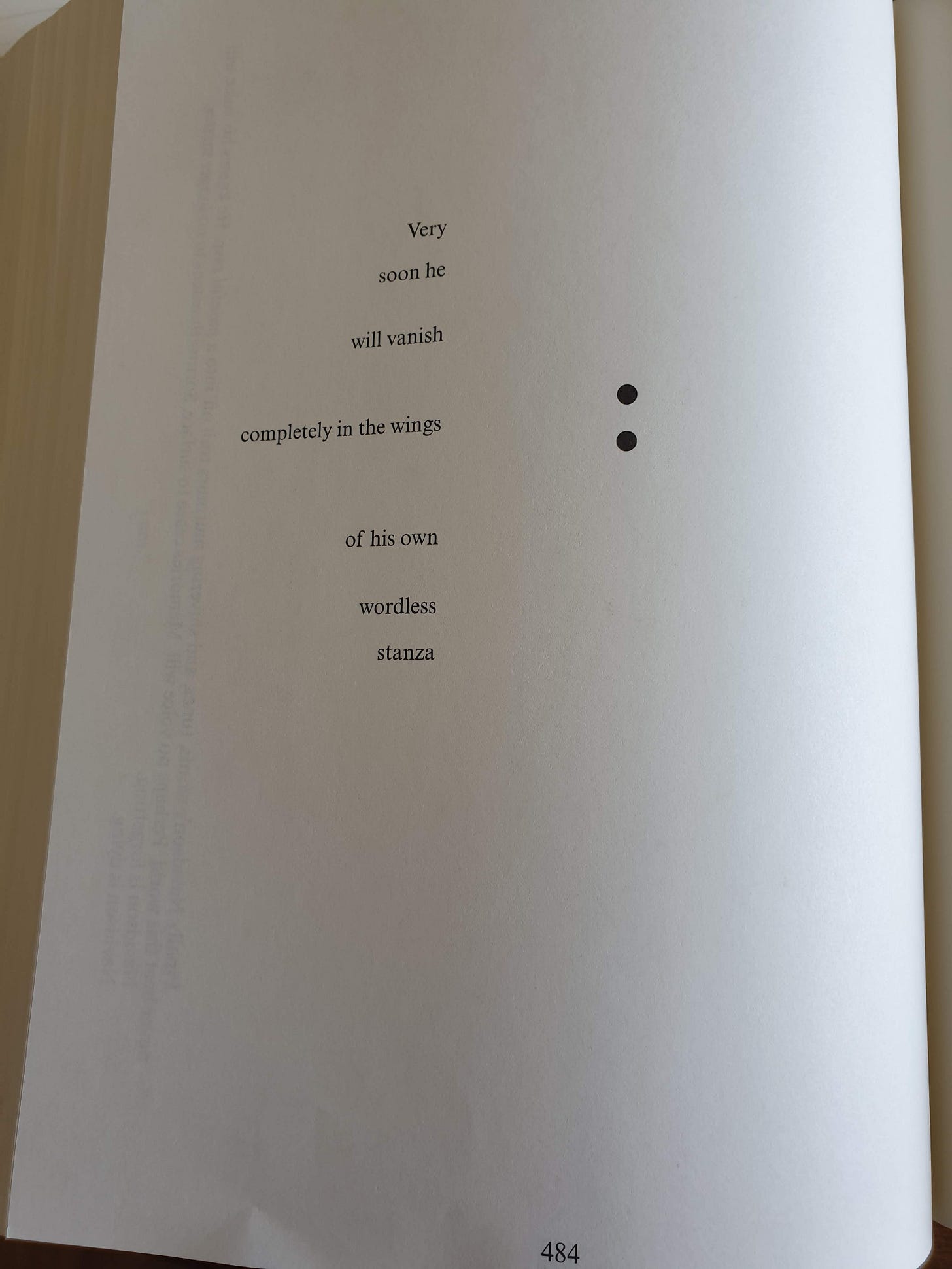The inimitable brilliance of Mark Z. Danielewski
or, a short embrace of the (un)Familiar
I first encountered House of Leaves1 as a teenager. The book was on a friend’s shelf. Just there; just another book in a sea of so many. Yet I was drawn to it—the ever-curious teenage me—and I found myself sliding it out. I couldn’t help it. I was touching the spine, opening the pages.
Then I slid it back into place, fleeing.
This is not for you.
It was 20 years before I’d touch House of Leaves again. In truth, I don’t think it had ever left my mind. Not truly. The notion of it was dormant, waiting for the right moment to say “Now. Now is the time. Hurry!” Because I do think there can be a right and wrong time for certain books2.
It wasn’t the same copy, of course—my friend’s is hopefully still there in England, waiting to lodge dormant in someone else’s brain. The copy I own, the remastered full-colour edition, appeared before me when I rounded a corner in the sunken Dymocks bookstore in the heart of Melbourne’s CBD. I don’t recall hesitating. I simply picked it up, paid for it; I read it on the tram home, then read it on the sofa, disappearing within it. Afterwards, nothing was ever quite the same.
But I don’t really want to talk about what the book is about. I couldn’t review it—I wouldn’t know how. It’s too vast and complex and deep and layered, written by an author who can’t possibly be of our world. I don’t understand how anyone could have written it.
I still get nightmares. In fact I get them so often I should be used to them by now. I’m not. No one ever really gets used to nightmares3.
I do, however, want to talk—show, in fact—MZD’s style. Just some of it, in case you happen to read this and you don’t know who he is or what he’s written. (I know there are a few other authors out there who play with design and layout, typesetting etc. but I don’t think anyone else comes close to Mark. If you have recommendations, I’d love to hear them in the comments.)
Here’s a window into the Tardissal [yes, that’s a word] content of HoL:
Danielewski later released a series of books under the title of The Familiar4, a vast interwoven work spanning multiple continents and characters. There were going to be several hundred 20 volumes, I believe, but unfortunately the production cost exceeded demand and as far as I’m aware only the first five made it to press. That’s tragic, as I’d argue these books are as equally brilliant, difficult and mysterious as House of Leaves and are pieces of art in themselves. The range of voice, prose and style found between The Familiar’s many pages rivals the ease of David Mitchel segueing all those boundless years in Cloud Atlas, but the added dimensions of typesetting elevate these books to another experience.

They are not easy books, nor are they for everyone. But to sit and read The Familiar is to inhabit a distinct set of minds, and as you do so you work to understand them. Take for example Anwar, the father of Xanther, the story’s central character (whether she knows it or not). Anwar codes for a living and his deep passion bleeds into his way of thinking, creating nested sets of thoughts that at first glance seem unreadable unparseable, but actually flow once you learn his syntax.

That’s but a small sampling, just a suggestion of MZD. The labyrinth is there waiting for you, should you wish to enter it.
~~~
As I was leafing through my copy of House of Leaves to take some photos, I found myself stopping to reread several sections. The book still gives me that same awe-filled unease as that very first time I encountered it. Is it really just a work of fiction written by Mark Z. Danielowski? Or is it something much, much more?
I’m sliding it back onto my own shelf now, so it can wait there for someone else.
A post I recommend
Hattie Crisell (of In Writing with Hattie Crisell) here on Substack recently posted a most excellent post about books that are lost to memory. As with all of Hattie’s articles, it’s a really insightful read.
Is everything, ultimately, an enormous waste of time if you don’t remember it?
If you enjoyed this post or found something interesting within it, please feel free share it, like it, comment. As always, that’d mean a lot.
https://www.penguinrandomhouse.com/books/36526/house-of-leaves-by-mark-z-danielewski/ (that’s the page that Mark links to from his own website, https://www.markzdanielewski.com/books-new)
I tried to read Gravity’s Rainbow last November, a book that'd been on my wishlist for the best part of a decade. A literary classic. A must-read. A difficult read. Sign me up! I got a third of the way through, but just had to stop. It wasn’t the right time. So it’s shelved for now, waiting to be picked back up. I respect the skill of Pynchon’s writing, but with all the things that needed doing towards the end of last year, it started to feel like a slog. I had to approach the book with a “come on, let’s see if we can do 10 pages” mentality, like it was some kind of intense core-session at the gym. That’s not how I want to read. Plus, the subject matter just doesn’t speak to me enough. Not yet, anyway.
Johnny Truant’s foreword to House of Leaves
These can still be found online, including links directly from Mark: https://www.markzdanielewski.com/books-new





Fascinating post. House of Leaves has always seemed like an intriguing concept for me, but given that it’s so difficult and long, I wonder if it wouldn’t just be one of those books that are so compelling they make me want to start them but then I begin to lose interest. Still, I might give it a try one of these days, once I finally finish Olga Tokarczuk’s Books of Jacob.
As for a recommendation for other authors who play with layouts, Max Porter comes to mind (Lanny, Shy), although I find him a bit boring. His word choice is clever and his short novels read more like poetry than prose, but for some reason I could never get absorbed in reading them.
Thank you for sharing!